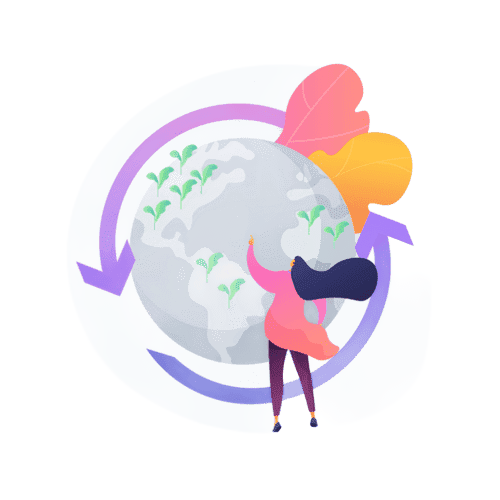Sustainability Through Collaboration: Driving Change Across Industries
Sustainability is not just an individual pursuit; it thrives in collaboration. In an era of climate change and increasing resource constraints, collective efforts across industries are essential to drive innovation, implement effective policies, and create a more sustainable future. We explore the significance of collaboration in sustainability across different sectors, including manufacturing, healthcare, technology, agriculture, and finance, highlighting how partnerships can lead to long-term sustainable growth.

Alright, let’s be real – saving the planet isn’t a solo mission. We need teamwork, fresh ideas, and industries working together to make real change happen. Whether it’s reducing waste in fashion, cutting down emissions in tech, or making healthcare more eco-friendly, sustainability works best when people collaborate. In this post, we’ll break down how industries like manufacturing, healthcare, tech, agriculture, and finance are teaming up to make sustainability the norm – not the exception.
The Importance of Collaboration in Sustainability
Sustainability is inherently multidisciplinary, requiring expertise from various sectors to solve complex challenges. Whether it is reducing carbon emissions, improving energy efficiency, or designing products that meet long-term sustainability goals, a collaborative approach allows for more holistic and effective strategies.
Collaboration fosters innovation by allowing diverse stakeholders – including policymakers, industry leaders, engineers, researchers, and environmentalists – to contribute their insights. This shared expertise creates solutions that are not only technically sound but also socially and economically viable.
Collaboration in Different Industries
1. Manufacturing and Industrial Collaboration
The manufacturing sector is responsible for a significant portion of global emissions and resource consumption. Collaborative efforts within the industry can lead to more sustainable production methods, waste reduction, and circular economy initiatives. For instance, partnerships between companies in supply chain optimization can help reduce material waste, improve energy efficiency, and develop eco-friendly packaging solutions. Companies like Tesla and Panasonic have collaborated to advance battery technology for electric vehicles, significantly reducing the carbon footprint of transportation.
2. Healthcare and Sustainability Partnerships
The healthcare industry is also recognizing the need for sustainable practices. Collaboration between hospitals, pharmaceutical companies, and technology providers can lead to reduced medical waste, improved energy efficiency, and more sustainable healthcare infrastructure. The implementation of digital health records, telemedicine, and smart medical devices are examples of how sustainability is being integrated into healthcare through collaborative efforts.
3. Technology and Digital Innovation
The tech industry is at the forefront of sustainability through collaboration. Companies are working together to develop energy-efficient data centers, reduce e-waste, and promote responsible sourcing of raw materials. Open-source initiatives, such as The Green Software Foundation, aim to make software development more energy-efficient by sharing best practices and tools. Cloud service providers are also investing in renewable energy to power data centers, demonstrating how cross-industry collaboration can reduce carbon footprints.
4. Agriculture and Food Systems
The agricultural sector faces major sustainability challenges related to land use, water consumption, and carbon emissions. Collaborative efforts between farmers, agribusinesses, and research institutions are driving innovations such as precision farming, regenerative agriculture, and sustainable supply chains. Organizations like the Sustainable Agriculture Initiative (SAI) Platform bring together companies from different sectors to develop standards and best practices for responsible farming.
5. Finance and Investment for Sustainability
The finance industry plays a crucial role in funding sustainable initiatives across all industries. Green finance and impact investing are growing trends where financial institutions collaborate with businesses and governments to fund renewable energy projects, sustainable infrastructure, and carbon offset programs. Collaborative efforts like the UN Principles for Responsible Investment (PRI) are encouraging financial institutions to integrate environmental, social, and governance (ESG) factors into their investment decisions.
%
job satisfaction
A survey conducted by the American Psychological Association found that nearly 70% of employees believe that work-life balance is a critical factor in their job satisfaction, and employees with a good work-life balance are 21% more productive than those without.
%
reduction in absenteeism
According to the 2023 Global Employee Well-Being Index, companies with comprehensive well-being programs see a 56% reduction in absenteeism and a 27% increase in employee retention, highlighting the significant impact of well-being initiatives on overall employee performance and loyalty.
Overcoming Barriers to Collaboration
Working together sounds great, but let’s be real – collaboration isn’t always easy. There are plenty of obstacles that get in the way. Here’s how we can smash through them:
- Breaking Down Industry Silos: Many industries work in their own little bubbles, which makes it hard to share knowledge and ideas. The fix? Companies need to create more open forums for collaboration, like industry-wide conferences, innovation hubs, and public-private partnerships.
- Shifting from Short-Term Profits to Long-Term Gains: Businesses love quick wins, but sustainability requires playing the long game. One way to fix this is through government incentives, where companies that invest in sustainability get tax breaks or funding for green projects.
- Making Sustainability Measurable: If we can’t track progress, it’s easy to ignore sustainability goals. Industries need better tracking tools—things like blockchain for transparent supply chains, AI for monitoring energy efficiency, and clear sustainability reporting standards.
- Consumer Pressure and Awareness: Let’s be real—brands won’t change unless consumers demand it. The more we push for sustainable products and businesses, the more industries will collaborate to meet these demands.
- Government Policies That Encourage Collaboration: Policies that reward companies for working together on sustainability can go a long way. Think about carbon credit programs or sustainability grants for businesses that collaborate on green initiatives.
Technology and Digital Collaboration for Sustainability
Digital tools are transforming the way industries approach sustainability. Artificial intelligence (AI) and blockchain technology enable greater transparency in supply chains, helping companies track emissions and resource usage more accurately. Cloud computing facilitates remote collaboration, reducing the need for business travel and lowering carbon footprints.
Emerging technologies like the Internet of Things (IoT) further enhance sustainability efforts by optimizing energy use, predicting maintenance needs, and facilitating adaptive manufacturing and agricultural techniques.
The Future of Sustainability Collaboration
Looking ahead, the success of sustainability initiatives will depend on the ability of industries to work together toward common goals. Some key developments that will shape the future of collaboration in sustainability include:
- Circular Economy Models: Encouraging resource efficiency through recycling and repurposing materials.
- Decentralized Energy Systems: Promoting local energy generation and distribution, such as community solar projects.
- Green Infrastructure Investments: Governments and private sectors prioritizing sustainable infrastructure development.
Conclusion
Sustainability is not a solo endeavor; it requires collective action across industries. By fostering collaboration between governments, businesses, academia, and communities, we can create a world that meets the needs of both present and future generations. The road to a sustainable future is paved with challenges, but through cooperative efforts and shared knowledge, a more resilient and greener world is within reach.
References
- International Energy Agency (IEA), 2015. Energy Efficiency Market Report.
- United Nations, 2015. Paris Agreement.
- UK Green Building Council (UKGBC), 2017. Sustainability in the Built Environment.
- Royal Academy of Engineering, 2010. Engineering a Low Carbon Built Environment.
- Stern, N., 2010. Stern Review: The Economics of Climate Change.
- Sustainable Development Foundation, 2014. Green Construction Board Knowledge and Skills Report.
- The Green Software Foundation. Sustainable Software Development Initiatives.
- UN Principles for Responsible Investment (PRI), 2021. Sustainable Finance and Investment Trends.
Wanna know more? Let's dive in!
ISO 9001 Checklist: A Step-by-Step Guide to Implementation
[dsm_gradient_text gradient_text="ISO 9001 Checklist: A Step-by-Step Guide to Implementation" _builder_version="4.27.0" _module_preset="default" header_font="Questrial|||on|||||" header_text_align="center" header_letter_spacing="5px" filter_hue_rotate="100deg"...
Read this before you read ISO 9001
[dsm_gradient_text gradient_text="The 7 principles of quality management" _builder_version="4.27.0" _module_preset="default" header_font="Questrial|||on|||||" header_text_align="center" header_letter_spacing="5px" filter_hue_rotate="100deg" hover_enabled="0"...
When AI Met ISO 9001
[dsm_gradient_text gradient_text="When AI Met ISO 9001" _builder_version="4.27.0" _module_preset="default" header_font="Questrial|||on|||||" header_text_align="center" header_letter_spacing="5px" filter_hue_rotate="100deg"...
Why Sustainable Car Design Matters
[dsm_gradient_text gradient_text="A Comprehensive Exploration of Agile Auditing" _builder_version="4.27.0" _module_preset="default" header_font="Questrial|||on|||||" header_text_align="center" header_letter_spacing="5px" filter_hue_rotate="100deg"...
Cultivating a Quality Culture: Guide to Organizational Excellence
In today’s rapidly evolving global marketplace, organizations across various sectors are recognizing the critical importance of fostering a culture centered on quality. This emphasis is not merely about adhering to standards or regulations but involves embedding quality into the very fabric of an organization’s ethos, operations, and interactions. A robust quality culture ensures that every member, from top leadership to frontline employees, is committed to continuous improvement, customer satisfaction, and operational excellence.
The Hidden Costs of Human Error in Healthcare
Human error is a significant challenge in healthcare, where even minor mistakes can have serious consequences. Unlike other industries, errors in healthcare directly affect human lives, making patient safety a top priority. The increasing complexity of modern healthcare, with its integration of technology and electronic health records, introduces both opportunities and challenges. The need for quality assurance is paramount in reducing human errors and ensuring high standards of patient care.
Consistency in Quality: The Foundation of Total Quality Management
In today’s fast-paced and competitive business landscape, ensuring quality is paramount for survival and success. Concepts such as Total Quality Management (TQM), Lean Manufacturing, and Time-Based Competition have gained prominence as organizations strive to enhance efficiency, reduce waste, and improve customer satisfaction. However, one of the most overlooked yet critical factors for the successful implementation of these quality programs is consistency in quality. Without consistency, even the most well-planned quality strategies may fail to yield the desired results.
Software Engineering Process and Quality Assurance Framework
The automotive industry is experiencing rapid transformation, driven by advances in technology, increasing competition, and evolving customer expectations. To stay ahead in this dynamic landscape, companies must continuously innovate while optimizing costs. One of the most effective strategies for achieving these objectives is outsourcing software development and engineering processes.
Elevating Software Quality in Automotive Engineering
In the ever-evolving landscape of automotive engineering, ensuring high software quality is a key challenge. With the increasing complexity of vehicle functionalities and the integration of advanced driver-assistance systems (ADAS), maintaining stringent quality standards is essential. Volkswagen introduced the Software Quality Improvement Leader (SQIL) initiative to bridge the gap between software quality and supplier collaboration, ensuring the highest standards in automotive software development.
The Future of Batteries: How Organic Batteries Are Changing the Game
Organic batteries are on the rise, offering safer, greener, and cheaper alternatives to traditional batteries. As research progresses, we can expect longer-lasting, flexible, and biodegradable batteries powering our future devices.
Organic Thermoelectrics: Turning Heat into Power
Imagine if you could charge your phone just by wearing your hoodie, or if your laptop could recycle its own heat to power itself. Sounds futuristic, right? Well, organic thermoelectrics are making this a reality! This cool (or should we say hot?) technology is all about using special materials to turn wasted heat into usable electricity.
Flawless Displays: How AI is Revolutionizing OLED Mura Defect Detection
In the rapidly evolving field of display technology, ensuring impeccable screen quality is paramount. Mura defects, characterized by irregular brightness or color variations, pose significant challenges in OLED display manufacturing. Traditional inspection methods often fall short in detecting these subtle imperfections. This comprehensive blog post delves into the innovative application of region-based machine learning techniques for effective Mura defect detection. By exploring the integration of advanced algorithms, dataset generation, and adversarial training, we highlight a robust approach that achieves superior accuracy and efficiency in identifying and classifying Mura defects.












